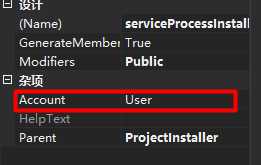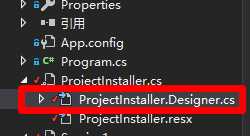c#编写的服务中访问网络位置的共享文件夹
2021-01-30 04:13
标签:kernel32 project log close using ken account ipa private 使用LocalSystem运行的服务不能访问共享文件夹,即使共享文件夹权限是对“EveryOne”可读写也不行,目前使用过两种方式,但都需要设置用户密码。 1、使用用户名加密码的方式运行服务。 将 ProjectInstaller 的 Account设置为User 然后打开 ProjectInstaller 的设计器代码 在 InitializeComponent 中设置 ProjectInstaller的Username和Password。运行服务时会直接以设置的用户名运行,可以直接访问该用户名可访问的所有位置。 2、通过API模拟用户登录,感觉比较灵活,可以在服务中随时切换到不同用户权限,服务的运行权限为LocalSystem。 调用方式 感觉第二种方式更灵活一点,先这样用了 c#编写的服务中访问网络位置的共享文件夹 标签:kernel32 project log close using ken account ipa private 原文地址:https://www.cnblogs.com/Elvis-Luo/p/11674635.html

public static class LogonNet
{
const int LOGON32_LOGON_INTERACTIVE = 2;
const int LOGON32_LOGON_NETWORK = 3;
const int LOGON32_LOGON_NEW_CREDENTIALS = 9;
const int LOGON32_PROVIDER_DEFAULT = 0;
const int LOGON32_PROVIDER_WINNT50 = 3;
const int LOGON32_PROVIDER_WINNT40 = 2;
const int LOGON32_PROVIDER_WINNT35 = 1;
[DllImport("advapi32.dll", CharSet = CharSet.Auto, SetLastError = true)]
public static extern int LogonUser(String lpszUserName,
String lpszDomain,
String lpszPassword,
int dwLogonType,
int dwLogonProvider,
ref IntPtr phToken);
[DllImport("advapi32.dll", CharSet = CharSet.Auto, SetLastError = true)]
public static extern int DuplicateToken(IntPtr hToken,
int impersonationLevel,
ref IntPtr hNewToken);
[DllImport("advapi32.dll", CharSet = CharSet.Auto, SetLastError = true)]
public static extern bool RevertToSelf();
[DllImport("kernel32.dll", CharSet = CharSet.Auto)]
public static extern bool CloseHandle(IntPtr handle);
private static WindowsImpersonationContext impersonationContext;
public static bool impersonateValidUser(String userName, String domain, String password)
{
WindowsIdentity tempWindowsIdentity;
IntPtr token = IntPtr.Zero;
IntPtr tokenDuplicate = IntPtr.Zero;
if (RevertToSelf())
{
if (LogonUser(userName, domain, password, LOGON32_LOGON_NEW_CREDENTIALS,
LOGON32_PROVIDER_DEFAULT, ref token) != 0)
{
if (DuplicateToken(token, 2, ref tokenDuplicate) != 0)
{
tempWindowsIdentity = new WindowsIdentity(tokenDuplicate);
impersonationContext = tempWindowsIdentity.Impersonate();
if (impersonationContext != null)
{
System.AppDomain.CurrentDomain.SetPrincipalPolicy(PrincipalPolicy.WindowsPrincipal);
IPrincipal pr = System.Threading.Thread.CurrentPrincipal;
IIdentity id = pr.Identity;
CloseHandle(token);
CloseHandle(tokenDuplicate);
return true;
}
}
}
}
if (token != IntPtr.Zero)
CloseHandle(token);
if (tokenDuplicate != IntPtr.Zero)
CloseHandle(tokenDuplicate);
return false;
}
public static void undoImpersonation()
{
impersonationContext.Undo();
}
}
private void test()
{
if (LogonNet.impersonateValidUser("userTest", "Users", "userPassword"))
{
using (StreamWriter writer=new StreamWriter("\\192.168.1.13\\ShareTest\\test.txt"))
{
writer.WriteLine("模拟登录访问网络共享文件成功");
}
}
}